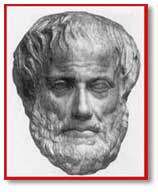Philosopher of
the Week. January 20th, 2003.
 Aristotle
(384-322 BCE.)
Aristotle
(384-322 BCE.)
Greece
Aristotle was born at Stagirius, a Greek
colony on the coast of Thrace. His father was the court physician
for the king of Macedonia. When he was 17, Aristotle was sent
to Athens to study at Plato's Academy. He stayed at the Academy
for 20 years both as a student and then as a teacher.
After Plato died in 347, Aristotle left
Athens, eventually ending up in Macedonia, where he became the
tutor of Alexander (the Great), son of the Macedonian king. When
Alexander became king in 335, Aristotle returned to Athens to
establish his own school called the Lyceum. At the Lyceum, discussions
were held while the teachers and students walked around the grounds
of the school, earning it the name of the "peripatetic", or walking,
school.
Aristotle's philosophy stresses biology,
instead of mathematics like Plato. He believed the world was made
up of individuals (substances) occurring in fixed natural kinds
(species). Each individual has built-in patterns of development,
which help it grow toward becoming a fully developed individual
of its kind. Nature has built into each individual patterns for
growth, purpose, and direction.
To organize these patterns, Aristotle
introduced the philosophic idea of causality. He believed that
each thing or event has more than one "reason" that
helps to explain what, why, and where it is. To Aristotle the
four causes are: the material cause, what something is made out
of; the efficient cause, the source of motion; the formal cause,
the species, kind, or type; and the final cause, the full development
of an individual or the intended function of an invention. For
example, a young lion is made up of tissue and organs (material
cause) by its parents who generated it (efficient cause). The
formal cause is its species, lion; and its final cause is its
instinct and drive to become a mature lion. Aristotle believed
that all things could be better understood when its causes were
stated in specific terms. He used his causal pattern to organize
all knowledge. Some of Aristotle's words of wisdom:
• "We are what we repeatedly
do. Excellence, then is not an act, but a habit."
• "Dignity does not come in
possessing honors, but in deserving them."
• "Poverty is the parent of
revolution and crime."
• "Man perfected by society
is the best of all animals; he is the most terrible of all when
he lives without law, and without justice."
• "It is not always the same
thing to be a good man and a good citizen."
• "What is a friend? A single
soul dwelling in two bodies."
• "We make war that we may
live in peace."
• "In all things of nature
there is something of the marvelous."
• "Man is by nature a political
animal."
• "Art completes what nature
cannot bring to finish."
• "It is the mark of an educated
mind to be able to entertain a thought without accepting it."
Classroom Discussion Questions:
How would Aristotle, have answered the
question, what is the meaning of life?
Which side would Aristotle argue in the
discussions about the possibility of war with Iraq? Why?
Aristotle wrote extensively on both
politics and ethics. Did he think they could co-exist? Why or
why not?
Do you think that they can exist together?
Why or why not?
Plato, Aristotle's teacher, had envisioned
an ideal society. How does Aristotle's ideal society differ from
Plato's? How are they the same?
What would Aristotle argue needs to be
done in order to create a perfect society?
How would you create a perfect society?
Support your answer.
To learn more about Aristotle, follow
these links:
http://www.utm.edu/research/iep/a/aristotl.htm
http://www-gap.dcs.st-and.ac.uk/~history/Mathematicians/Aristotle.html
http://www.knuten.liu.se/~bjoch509/philosophers/ari.html
http://www.ucmp.berkeley.edu/history/aristotle.html
http://classics.mit.edu/Browse/browse-Aristotle.html
http://www.rit.edu/~flwstv/aristotle1.html
http://www.newadvent.org/cathen/01713a.htm
http://www.philosophypages.com/ph/aris.htm
http://www.wsu.edu/~dee/GREECE/ARIST.HTM
http://www3.baylor.edu/~Scott_Moore/aristotle_info.html
TO LEARN ABOUT OUR OTHER "PHILOSOPHERS
OF THE WEEK" CLICK ON ONE OF THE PHOTOS BELOW.

